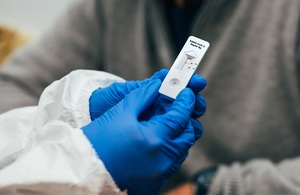The Insolvency Service welcomes new chair and board members
Incoming Chair, Mark Austen, will be joined by Gary Kildare, Samantha Durrant and Rob Hunt on the Insolvency Service Board.
The new non-executive board members, together with Mary Chapman who is continuing in her role on the board, will work closely with the Insolvency Service’s senior leadership team to provide strategic leadership and governance for the agency.
The Insolvency Service’s Chief Executive, Dean Beale, said:
I am very pleased to welcome Mark, Gary, Samantha and Rob to the board at what is an important time for the Insolvency Service as we support the country’s recovery from the pandemic and ensure that insolvency processes operate efficiently and effectively for businesses and individuals.
The new board members bring significant experience in their respective fields and will provide valuable support and guidance to the Executive Leadership Team as we deliver the agency’s objectives.
I would also like to take this opportunity to recognise the immense contribution and support of the outgoing board members. Their hard work, dedication and expertise over the past few years has supported the agency to consistently deliver its objectives.
Mark Austen is an experienced financial services professional, having been a partner and board member of global accountancy firm PricewaterhouseCoopers, where he led major changes to the financial services environment in the UK. Mark was also a senior partner at IBM and has served as chair and director of several other commercial and not-for-profit boards, including LV=, Standard Bank PLC, Mott MacDonald, The Home and Savings Bank and one of HRH Prince of Wales’s charities. Mark is currently Chair of a UK bank and Transform Housing and Support, a major housing charity in Surrey. He has also regularly contributed to Speeches for Schools and the Mentoring Foundation.
Samantha Durrant has worked as a senior leader in a broad range of organisations across the public and private sectors. Previously, Samantha was the UK Chief Operating Officer of a global health and benefits consulting firm and brings a wealth of executive leadership experience in areas such as operations, business change, customer management and governance. Samantha performs a variety of non-executive director roles for several organisations, including chairing the Change Management Committee for the Disclosure and Barring Service and chairs the Finance & Performance Committee for the NHS Sussex Commissioners.
Rob Hunt is a restructuring specialist and was a partner in PricewaterhouseCoopers’ business recovery services practice. He led their UK mid-market restructuring practice and was also elected to the PricewaterhouseCoopers’s Supervisory Board. Recently, Rob has worked as an independent adviser providing turnaround and restructuring advice to a range of businesses and is a former member ICAEW Insolvency Committee.
Gary Kildare is an experienced business executive and has previously served in senior HR roles for IBM, including: Chief HR Officer for Europe and Global Head of Labour Relations for the IBM Corporation in New York and Madrid; Chief HR Officer for IBM’s consulting business based in Paris; Chief HR Officer for Global Technology Services, based in New York; and as Vice President of HR for Americas, EMEA and Asia Pacific. He is a Chartered Fellow of the Institute of Personnel and Development and a Fellow of the Royal Society of Arts. Gary also serves as a non-executive director for several organisations, including Chair of the People Committee for The Defence Infrastructure Organisation, a lay-member of the Legal Services Board, a non-executive director of the British Quality Foundation and a member of the CBI Business Council for Scotland.
Board members are appointed initially for three-year terms. The newly appointed board members take over from Stephen Allinson, Alan Graham and Richard Oirschot who have now completed their term of service on the board.
Mary Chapman will remain on the board having first joined in 2017. Mary previously served as Chief Executive of the Chartered Management Institute and Chief Executive of Investors in People UK, as well as holding several senior director roles for companies within the L’OREAL Group. Mary is a Chartered Director and has served as a non-executive board member for public organisations including the Royal Mint Ltd, the National Lottery Commission, the Gambling Commission and Brunel University London. Currently Mary is Chair of the General Chiropractic Council and a Trustee of the British Tourist Boards Pension Scheme.
Incoming Chair, Mark Austen, said:
I am much looking forward to working with the senior team to build on the legacy of my predecessor, Steve Allinson, in the continuing development of the Service. Such development is ever more pressing now as the comprehensive pandemic support measures are unwound.
